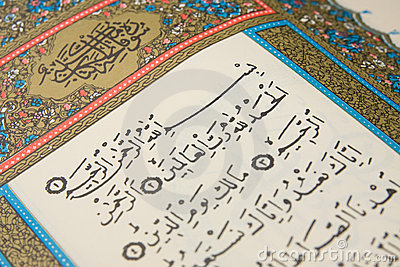 |
|
 |
 AN OBJECTIVE PERSPECTIVE
AN OBJECTIVE PERSPECTIVE Imaamah and the Quran
chapter two
Quran As Our Reference
I had been encouraged by the two Sunni brothers to look into the Quran as my first and primary point of reference when examining the doctrine of Imaamah. I had not been thinking about making this sort of comparison before, because Shias rarely use Quranic Verses when trying to “prove” the doctrine of Imaamah. There is some usage of Verses when trying to show the “superiority” of Ali and the Imaams, but even in these cases the focus is quickly shifted to Ahadeeths. I must admit that Sunnis themselves have not written much on the topic of “Imaamah and the Quran” when answering the Shia claims. Thus, I decided that using the Quran was the proper way for me to start judging the correctness of the Imaamah doctrine.
Why use the Quran as a first reference

There will undoubtedly be those readers who are wondering as to why I would use the Quran as the main source of reference when discussing the Shia concept of Imaamah. “Should we not refer to the Prophet’s Ahadeeths and historical events also?” is a common question in the minds of many people.
In order to answer the concerns of those who may be thinking along those lines, the following points should be considered:
- The Sunni and Shia sects have drifted apart considerably when it comes to Ahadeeth and its sciences. The criteria for authenticating Ahadeeth in terms of its isnad (chain of narrators), the textual acceptability of a given narration (adequacy of its matn), and even what constitutes a “Hadeeth”, are only some of the few important issues that differentiate Sunnis and Shias whenever their respective scholars study and examine a given narration. Such a topic may be of interest for those who have a sound footing in the sciences of Ahadeeth, but the bulk of Sunnis and Shias will not be able to pass correct judgements on these issues.
- In 14 centuries of Islamic history, there is no book of Ahadeeth that both Sunnis and Shias can agree to and say that it contains only Saheeh Ahadeeth according to their criteria. This is important to note, since scholars normally use a number of related Ahadeeth to interpret a given situation or to arrive at a fiqhi ruling about a practice.
In view of this reality, the “Lowest Common Denominator” should be found, a work that will be accepted as fully authentic in terms of its message and its integrity by both the Sunni and Shia sides. This book is, of course, the Noble Quran. Therefore, the first and most important place to look for resolving big differences of doctrine such as those between the Sunni and Shia sects should be the Quran.
- It is an established fact that the Quran is the main and foremost source of legislation in Islam, superior to
Ahadeeth. Thus, a given Hadeeth cannot be accepted if it goes against the meaning of a Quranic Verse.
Concerning these two principles, the following Shia narrations about the overriding importance of the Quran can be presented:
‘If you come across two hadiths related from us 26 then compare them with the book of Allah, what is in concord then take it and what is in disagreement then reject it.’ 27
‘Whatever comes to you related from us then compare it with the book of Allah, whatever is in concord with it then accept it and what contradicts it then reject it.’ 28
It is the proof of Alláh before His creation. He has taken from them a pledge (to act) upon it. He has perfected its effulgence, and completed through it His religion.) 29
Then, Alláh sent to him the Book as a light… Therefore, it is the mine of belief and its centre, the source of knowledge and its oceans, the plantation of justice and its pools, the foundation stone of Islam and its construction…
construction… Alláh has made it … an argument for him who argues with it, a witness for him who quarrels with it, a success for him who argues with it, a carrier of burden for him who seeks the way, a shield for him who arms himself (against misguidance), a knowledge for him who listens carefully, worthy story for him who relates it and a final verdict of him who passes judgements. 30
From the Sunni side, the following narrations concerning the importance of the Quran have been included in the body of Sunni literature:
Narrated 'Uthman: "The best of you is he who learns the Qur'an and teaches it." 31
“ 'Uqba b. 'Amir reported: When we were in Suffa, the Messenger of Allah (may peace be upon him) came out and said: Which of you would like to go out every morning to Buthan or al-'Aqiq and bring two large she-camels without being guilty of sin or without severing the ties of kinship? We said: Messenger of Allah, we would like to do it. Upon this he said: Does not one of you go out in the morning to the mosque and teach or recite two verses from the Book of Allah. the Majestic and Glorious? That is better for him than two she-camels, and three verses are better (than three she-camels). and four verses are better for him than four (she-camels), and to on their number in camels.” 32
“Salim narrated on the authority of his father (Ibn 'Umar) that the Apostle of Allah (may peace be upon him) said: Envy is not justified but in case of two persons only: one who, having been given (knowledge of) the Qur'an by Allah, recites it during the night and day (and also acts upon it) and a man who, having been given wealth by God, spends it during the night and the day (for the welfare of others. seeking the pleasure of the Lord).” 33
Narrated Abu Huraira: The Prophet said, "Every Prophet was given miracles because of which people believed, but what I have been given, is Divine Inspiration which Allah has revealed to me. So I hope that my followers will outnumber the followers of the other Prophets on the Day of Resurrection." 34
- There are those who say that the Quran is not easy to understand without the help of the Prophet (or in
the case of Shias) an “Imaam”. While this view does hold partial plausibility, it stands weakened due to the
following reasons:
a. The above-cited narrations would not have been uttered by the Prophet or the “Imaams” if normal people had a very limited capability of understanding the Quran, or if the Quran’s importance was subservient to other religious scriptures. Rather, the center of Islamic knowledge would have been the Ahadeeth, with the Quran having a secondary role in determining Islamic doctrine.
b. There are Verses in the Quran stating in unambiguous terms that the Holy Revelation contains no crookedness in it, is a guide for the believers, and that those who go against the Scripture are in a terrible loss. Some of these Verses are:
ذَٰلِكَ الْكِتَابُ لَا رَيْبَ ۛ فِيهِ ۛ هُدًى لِّلْمُتَّقِينَ ﴿٢﴾
This is the Scripture whereof there is no doubt, a guidance unto those who ward off (evil). (Quran 2:2) 35
ذَٰلِكَ بِأَنَّ اللَّـهَ نَزَّلَ الْكِتَابَ بِالْحَقِّ ۗ وَإِنَّ الَّذِينَ اخْتَلَفُوا فِي الْكِتَابِ لَفِي شِقَاقٍ بَعِيدٍ ﴿١٧٦﴾
That is because Allah hath revealed the Scripture with the truth. Lo! those who find (a cause of) disagreement in the Scripture are in open schism. (Quran 2:176)
الر ۚ كِتَابٌ أُحْكِمَتْ آيَاتُهُ ثُمَّ فُصِّلَتْ مِن لَّدُنْ حَكِيمٍ خَبِيرٍ ﴿١﴾
Alif. Lam. Ra. (This is) a Scripture the revelations whereof are perfected and then expounded. (It cometh) from One Wise, Informed (Quran 11:1)
إِنَّ هَـٰذَا الْقُرْآنَ يَهْدِي لِلَّتِي هِيَ أَقْوَمُ وَيُبَشِّرُ الْمُؤْمِنِينَ الَّذِينَ يَعْمَلُونَ الصَّالِحَاتِ أَنَّ لَهُمْ أَجْرًا كَبِيرًا ﴿٩﴾
Lo! this Qur'an guideth unto that which is straightest, and giveth tidings unto the believers who do good works that theirs will be a great reward. (Quran 17:9)
الْحَمْدُ لِلَّـهِ الَّذِي أَنزَلَ عَلَىٰ عَبْدِهِ الْكِتَابَ وَلَمْ يَجْعَل لَّهُ عِوَجًا ۜ ﴿١﴾ قَيِّمًا لِّيُنذِرَ بَأْسًا شَدِيدًا مِّن لَّدُنْهُ وَيُبَشِّرَ الْمُؤْمِنِينَ الَّذِينَ يَعْمَلُونَ الصَّالِحَاتِ أَنَّ لَهُمْ أَجْرًا حَسَنًا ﴿٢﴾
Praise be to Allah Who hath revealed the Scripture unto His slave, and hath not placed therein any crookedness, (But hath made it) straight, to give warning of stern punishment from Him, and to bring unto the believers who do good works the news that theirs will be a fair reward (Quran 18:1-2)
أَوَلَمْ يَكْفِهِمْ أَنَّا أَنزَلْنَا عَلَيْكَ الْكِتَابَ يُتْلَىٰ عَلَيْهِمْ ۚ إِنَّ فِي ذَٰلِكَ لَرَحْمَةً وَذِكْرَىٰ لِقَوْمٍ يُؤْمِنُونَ ﴿٥١﴾
Is it not enough for them that We have sent down unto thee the Scripture which is read unto them? Lo! herein verily is mercy, and a reminder for folk who believe. (Quran 29:51)
وَلَقَدْ يَسَّرْنَا الْقُرْآنَ لِلذِّكْرِ فَهَلْ مِن مُّدَّكِرٍ ﴿١٧﴾
وَلَقَدْ يَسَّرْنَا الْقُرْآنَ لِلذِّكْرِ فَهَلْ مِن مُّدَّكِرٍ ﴿٢٢﴾
وَلَقَدْ يَسَّرْنَا الْقُرْآنَ لِلذِّكْرِ فَهَلْ مِن مُّدَّكِرٍ ﴿٣٢﴾
وَلَقَدْ يَسَّرْنَا الْقُرْآنَ لِلذِّكْرِ فَهَلْ مِن مُّدَّكِرٍ ﴿٤٠﴾And in truth We have made the Qur'an easy to remember; but is there any that remembereth? (Quran 54: 17, 22, 32, 40)
- The issues that will be raised up in this work with respect to the Quran and Imaamah are, by the will of
Allah, those that can be clearly verified and easily understood by any reader, regardless of religious
persuasion.
As I mentioned in the beginning of this chapter, the Quran is used as the primary source in this work. This does not mean that it is the only source: where appropriate, the explanations given by Sunni and Shia scholars for the given Verse will be presented and some Ahadeeths connected with such interpretations will be commented upon.
From the Sunni side, the Tafseers of Ibn Kathir, at-Tabari, and al-Qurtubi will be used, as they are among the most respected of Sunni commentaries.
From the Shia side, the commentaries of Al- Qummi, Allamah Kashani’s Tafseer Al-Safi, Majma ul Bayan by Tabbarsi, Al-Mizan by Allamah Tabatabai, Tafseer Tibbyan by Tusi, the Tafseer by Grand Ayatullah Makarem Shirazi and the Ayatullah Mahdi Puya/ S.V. Mir Ali English Commentary 36 are appropriate sources of reference. This method is adopted with the aim of showing how the scholars on each side view the Verse, so that a better assessment may be made as to which of the positions is more suitable.

FootNote:
26The “us” in this and the following narration are the Imaams of the Shia faith.
27 Al-Istibsar: Volume 1, p.190.
28 Al-Istibsar: Volume 3, p.158.
29 Nahjul Balagha, Volume 2, p. 111, Sermon 183
30 Nahjul Balagha, Volume 2, pp. 177-178, Sermon 198
31 Saheeh Bukhari, Volume 6, Book 61 (Virtues of the Quran), Number 545
32 Saheeh Muslim, Book 4 (The Book of Prayers), Chapter 132, Number 1756
33 Saheeh Muslim, Book 4 (The Book of Prayers), Chapter 138, Number 1777
34 Saheeh Bukhari, Volume 6, Book 61(Virtues of the Quran), Number 504
35 All English translations of the Holy Quran are taken from Muhammad Marmaduke Pickthal’s translation, unless otherwise specified.
36 The Mahdi Puya/Ali commentary is not counted among the classical Shia commentaries. However, since it is the one of the main contemporary Shia interpretations in the English language, it can serve for us to understand how present-day Shias interpret many of the Quranic Verses.
